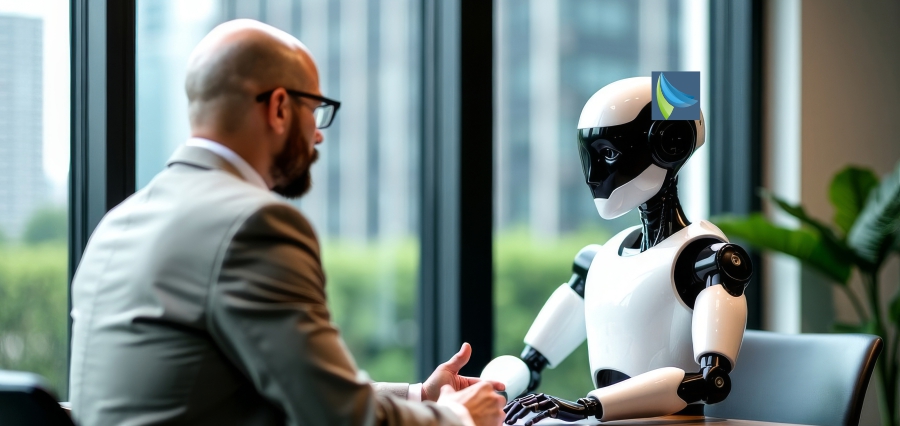The Future of HR
With the rapid expansion of the digital revolution, it is now well-known that technology will change industries. In Human Resources (HR) departments, AI, machine learning, and automation are changing the ways organizations recruit, engage, and manage people. With this influx of intelligent machines, though, one question begging to be asked is whether robots will take over our jobs in Human Resources.
Automation in the Field of Human Resource
HR processes have begun to be automated. Large HR functions are automatized with time-consuming activities such as application screening, payroll processing, employee onboarding, and benefit enrolment. AI-powered technology not only aids the HR function in its efficiency, but it also minimizes human error and operational costs.
Essentially, these analytical advanced tools let the HR professional make decisions based on large data regarding the management of human resources, making assessments, and employee engagement matters. Among such applications are chatbots that respond to employee queries, thereby smoothening HR communications and allowing the HR team to focus on more strategic initiatives.
HR Reinvented
While automation may replace certain mundane tasks, it is unlikely to eliminate completely the human touch in HR. Instead, human resources is gently evolving into a more strategic, people-oriented entity.
HR leaders could now effectively transfer all administrative functions to machines and are encouraged to spend more time on tasks requiring emotional intelligence, creativity, and critical thinking. Among those are strategies for fostering organizational culture, advocating diversity and inclusion programs, starting to enhance employee experiences, and developing leadership capabilities.
Due to this shift, more emphasis will be placed in the HR of the future on human skills like empathy, communication, and conflict resolution – areas where robots have presently not excelled.
AI as a Support: Not to Replace
If HR professionals consider AI and automation as partners rather than foes, these systems can be viewed as enhancing their own capabilities. For example, AI can analyze employee feedback for patterning and potential problems, thus allowing for proactive HR intervention.
Predictive models will enable HR to forecast workforce trends, skill gaps, and targeted training solutions, providing HR with more clout internally.
An Ethical and Privacy Approach
As automation becomes widespread, so too will the consideration of ethics and data privacy around its use. Therefore, HR leaders must respond to these challenges to guarantee that AI-induced actions are just, transparent, and unbiased.
Additionally, safeguarding the privacy and confidentiality of employee data will be paramount. Organizations must implement strong data governance frameworks to protect sensitive information and subsequently bolster trust with their workforce.
The Future HR Professional: A Hybrid Skillset
HR professionals will be expected to create the hybrid skillset that thrives in this technology-led environment, combining technical skills with traditional interpersonal skills.
Knowing how to collaborate with artificial intelligence software, understanding data analytics, and keeping track of technological innovations will be essential. Parallelly, HR leaders will need to hone their managerial people skills to engage employees and encourage a favorable working atmosphere.
These professionals must continuously learn and upgrade their skills to remain relevant and adaptable in fast-moving technology.
Employee Empowerment by Technology
If anything, automation can empower workers through other means: relieving them from repetitive functions, thus allowing them to concentrate on value-adding functions.
Once again, the HR leader stands at the helm of this transformation, establishing a learning and innovation culture. Such a culture could allow HR to technologically equip its workforce to cope with new developments in technology and build a future-ready workforce within different moving environments.
Future: An Evenly Tipped Scale
The future of HR will be the nicely balanced ecosystem of both human and machine use. Computers will undoubtedly carry out routine work, yet imagination and critical thinking laced with empathy will remain irreplaceable traits.
Those HR professionals equipped with tech skills will use their new-found abilities to usher in organizational success. They will be worthy architects of the future of work and nurturers in ensuring that the work stays fundamentally human.
In essence, the question is not whether robots will take our jobs in HR but rather how we will utilize them to design work that is more important and impactful. The future will go to those who will be navigating this new environment with an outlook of innovation, collaboration, and continuous learning. This journey has just begun, and the HR leaders are in a position to trailblaze toward this exciting and transformational future.
Source:https://www.insightssuccess.in/will-robots-take-our-jobs/

